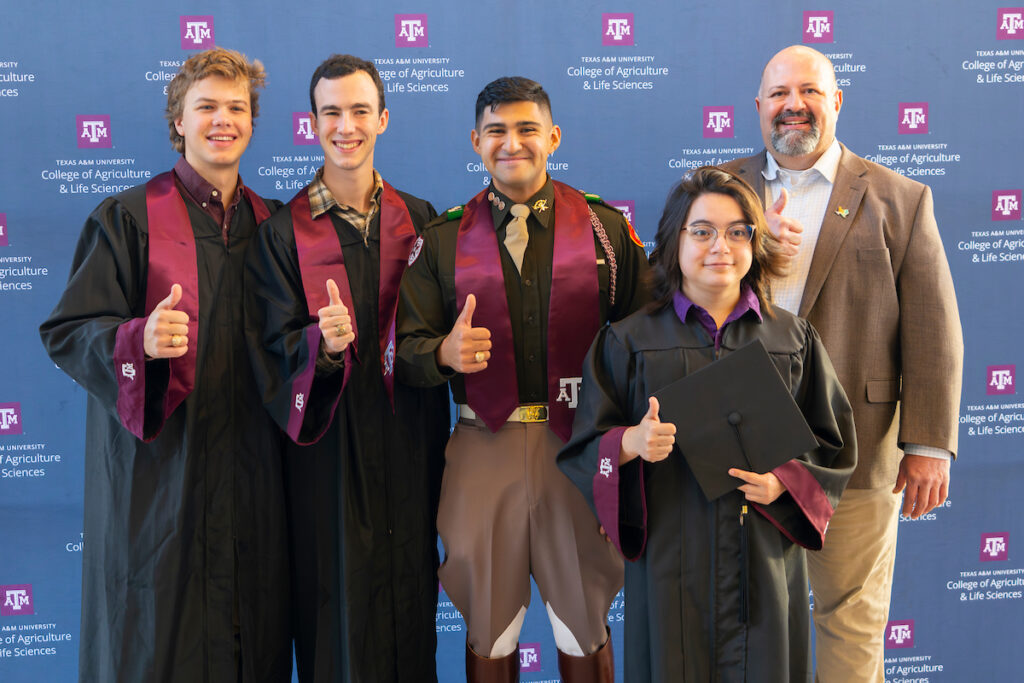Department of Rangeland, Wildlife and Fisheries Management graduates first cohort
Students share motivations, experience and future plans
The Department of Rangeland, Wildlife and Fisheries Management celebrated an important milestone on Dec. 14 as four students crossed the stage at the Texas A&M College of Agriculture and Life Sciences graduation ceremony to become the department’s first official cohort of graduates.

The department was established in January 2020 through a restructuring of the former Department of Ecosystem Science and Management and Department of Wildlife and Fisheries Sciences.
“This is a momentous occasion in the history of the department,” said Roel Lopez, Ph.D., professor and department head. “We have achieved much over the past three years, and the success of these students represents our ongoing mission — preparing the next generation of natural resource stewards.”
The new Bachelor of Science in Rangeland, Wildlife and Fisheries Management offers four specialized degree tracks enabling students to pursue focused studies in rangeland management, wildlife management, aquaculture and fisheries management, as well as natural resources management and policy.
“Our goal is to equip students with the scientific knowledge and applied technical skills necessary to develop as professional land stewards addressing the diverse challenges facing our natural resources,” Lopez said.
The first four graduates are Taylor Saucedo ’23, Dallas; Michael Fuehrer ’23, Ada, Michigan; Noah Pastor ’23, Austin; and Aimee Ornelas ’23, Austin.
Students take next steps to apply skills learned
For Saucedo, a lifelong love of the environment and the desire to make a positive impact led him to pursue a bachelor’s with a focus in natural resources management and policy.
“Someone should pursue a degree in rangeland, wildlife and fisheries management if they care about the environment and people and want to be a part of something bigger than themselves,” Saucedo said.
Saucedo served in the Texas A&M Corps of Cadets and will continue to develop his leadership skills after graduation through the Texas A&M Agricultural and Natural Resources Policy Internship Program as well as the U.S. Marine Corps Officer Candidate School.
“This spring, I’ll work at the office of U.S. Rep. Jasmine Crockett in Washington, D.C.,” he said. “Once the spring internship wraps up, I’ll head to Quantico, Virginia, with the goal of being commissioned as a second lieutenant in the Marine Corps.”
Fuehrer said he grew up hunting, fishing and backcountry camping.
After completing the wildlife management degree track, he said he looks forward to using this knowledge to benefit wildlife conservation in his home state.
“I have submitted a number of job applications with the Michigan Department of Natural Resources, and I am also considering pursuing a graduate degree in forestry back home,” Fuehrer said. “Either way I am looking forward to taking my new skills back home to the Great Lakes.”
Pastor said his time with the department was spent working alongside like-minded peers to learn and apply a variety of natural resource management strategies to real-world issues.
“The faculty regularly incorporated relevant natural resource-based scenarios into the coursework,” Pastor said. “There was also consistent involvement from outside speakers working in the natural resource profession.”
Pastor said these speakers helped further solidify how the concepts covered in the classroom translate to current resource management topics the students will encounter as professionals.
Following graduation, he will begin his own career in natural resources as an environmental scientist with Environmental Science and Engineering Partners.
Looking ahead
Much like these graduating students, Lopez said the department is focused on the future — specifically how to best prepare and place students as they embark in a natural resource career.
In addition to expanded degree programming and course offerings, Lopez said future students can expect more transformative, field-based experiences that will set them apart as they enter the workforce.
“Our departmental outlook is one of continuous growth and improvement,” Lopez said.
For more information on undergraduate and graduate degree programming offered by the department, visit https://rwfm.tamu.edu.





